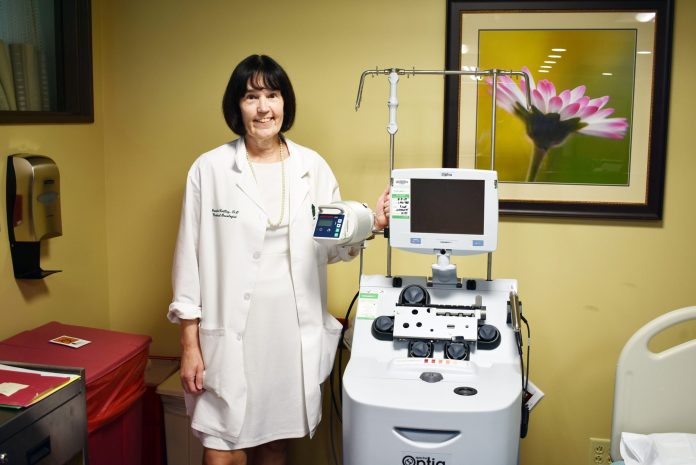Kate Stier signed up for the Be the Match blood and bone marrow donation program 15 years ago, but never got a call. The Turnersville, New Jersey resident had just joked with her husband that they would find a match when the joke came true, and she went to Cancer Treatment Centers of America in Philadelphia to donate.
“We lost our nephew to cancer when he was 7, and my father just passed away from cancer not too long ago, so that was my justification in saying this was the right thing to do,” she said.
After going through months of blood and lab work, Stier recently went in to CTCA, located in Frankford, to donate bone marrow. The procedure required her to lay on her stomach for a total of about eight hours at the center, and she also took a few days off from work.
Stier is far from the only donor who has come in to CTCA to donate recently. Ever since Hahnemann Hospital closed this summer, Dr. Pamela Crilley, DO, has seen much more activity at CTCA for the Be The Match program, sending stem cells to recipients in need all over the world.
“Once Hahnemann was closing we increased our volume,” Crilley said. “It’s still primarily stem cell collections, but we’ve had a lot of requests for bone marrow harvests because not many institutions do it anymore.” Crilley said CTCA in Philadelphia has seen as many as five matches within a couple of days of each other.
Be The Match is a program that connects patients with blood cancers like leukemia or lymphoma, or other life-threatening diseases with blood type matches. Seventy percent of patients do not have a fully matched donor in their family, meaning they rely on a donor. Since 1927 the program has facilitated more than 92,000 transplants, including nearly 6,200 in 2018.
“I always feel privileged to meet a donor because it’s just incredible they stop what they’re doing to donate,” Crilley said.
Once a potential match is found, donors will go into centers such as CTCA for blood tests to be seen by a transplant physician to make sure the donor is healthy and the match will work. Once the patient is found to be a good match and a time to do the transplant is coordinated between the donor and recipient, they will be connected to an apheresis machine that will take the donor’s blood, filter out the stem cells and return the blood to the donor. If they are donating bone marrow, they will have a needle inserted in their lower back.
“A thing that is unique about this donation is they don’t lose anything. You make those cells up within a couple of days,” Crilley said.
The public can join the Be The Match registry at BeTheMatch.org. People ages 18 to 44 are the most urgently needed. ••





